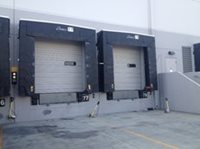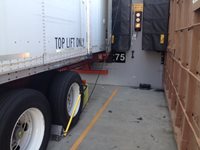Working for a company previous to becoming an owner-operator, we had a program that enriched the skills of one's job by showing them the end result of their own work in another person's hand. This form of job enrichment can be very beneficial to helping a person better understand why certain processes are done the way they are. Oftentimes, one person can not fully appreciate their job unless they know how their own work affects another. I feel that this is something that is lacking in our industry as a whole and in many different aspects. We as drivers, especially those with major carriers, see similar misunderstandings in the dispatcher/driver relationship. I know most of us will agree that it is a rare thing in most companies to have a dispatcher these days that has actually been a driver prior to taking a desk. A similar lack of appreciation and understanding for what we do has been witnessed by me coming from warehouses in the area I run. This can have an all too familiar effect on the urgency in which the warehouse unloads or loads the freight in the box that I am delivering.
 For the most part, warehouses have a staff of unloading crew, whether it is hand loading or forklift drivers. With great confidence I can say that most of these people in this position have not been commercial drivers, although I have met a couple that have retired to take the wheel of a forklift. The warehouse supervisors are much in the same boat when it comes to never having driven a truck as a licensed professional. Here lies a problem that comes in the form of a disconnect between the warehouse and the driver delivering the goods. Most of us work under an incentive of the quicker we can get unloaded or loaded and out of there, the quicker we can get our next revenue-producing load. When it comes to most of the average hourly, salaried, or temporary warehouse workers, they are just going through the motions and have no understanding of our sense of urgency. In there eyes, they maty see nothing more than a pushy driver that is in a hurry.
For the most part, warehouses have a staff of unloading crew, whether it is hand loading or forklift drivers. With great confidence I can say that most of these people in this position have not been commercial drivers, although I have met a couple that have retired to take the wheel of a forklift. The warehouse supervisors are much in the same boat when it comes to never having driven a truck as a licensed professional. Here lies a problem that comes in the form of a disconnect between the warehouse and the driver delivering the goods. Most of us work under an incentive of the quicker we can get unloaded or loaded and out of there, the quicker we can get our next revenue-producing load. When it comes to most of the average hourly, salaried, or temporary warehouse workers, they are just going through the motions and have no understanding of our sense of urgency. In there eyes, they maty see nothing more than a pushy driver that is in a hurry.
So now comes the hard part! How do we enrich the understanding of our job to the common warehouse worker? I have taken an approach to tackling it one person at a time, which is always the most direct, yet slowest way to go. I have found that if I am allowed to be on the dock or in the warehouse, I can communicate ahead of time the parameters in which I need to operate at their facility and clarify any misunderstandings. In short, I am civil and concise with them, which in itself can often alleviate having a problem in the first place. After that I make it a point to ask how long it might take from my appointed time and check back (politely) every forty-five minutes to an hour. I often try to stay back with them on the dock and can often strike up conversation with them about something to do with trucking. Whether it is "How do you like driving?", " That's one heck of a paint color!", or "I've been thinking about getting a CDL.", I usually find that a lot of them have an unfed interest in the trucking community.
 Using the doors opened by loading or unloading at a warehouse to help educate a non-driver can have lasting effects. Letting them know how we make a living, all while being professional and courteous, can do a lot more than most would figure in the driver/warehouse worker relationship. I have made a lot of friends at warehouses I frequent this way and always seem to get the best service possible from those where I took the time to help them understand what trucking is all about. Often times, there is not a lot of knowledge that transfers from behind the dock door to the cab, but when it does, it can make all of our lives in trucking just a little bit easier. Not that I am saying a little shared knowledge between drivers and dock workers will solve our industry-wide problem of detention, but it sure couldn't hurt!
Using the doors opened by loading or unloading at a warehouse to help educate a non-driver can have lasting effects. Letting them know how we make a living, all while being professional and courteous, can do a lot more than most would figure in the driver/warehouse worker relationship. I have made a lot of friends at warehouses I frequent this way and always seem to get the best service possible from those where I took the time to help them understand what trucking is all about. Often times, there is not a lot of knowledge that transfers from behind the dock door to the cab, but when it does, it can make all of our lives in trucking just a little bit easier. Not that I am saying a little shared knowledge between drivers and dock workers will solve our industry-wide problem of detention, but it sure couldn't hurt!